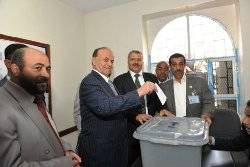Polling stations across Yemen have opened in a presidential poll with Vice-President Abd-Rabbu Mansour Hadi as the only candidate.
Hadi's guaranteed election by virtue of being the sole candidate on the ballot will bring the curtains down on Ali Abdullah Saleh's 33-year rule over the country.
Tuesday's vote is the result of a power-transition deal brokered by Yemen’s Gulf neighbors in November after months of protests calling for Saleh’s removal.
The Gulf-brokered deal gave Saleh and his closest aides immunity from prosecution and made him honorary president.
It also stipulated that Hadi become the next president of Yemen for an interim two-year period.
Reporting from Sanaa, Al Jazeera's Hashem Ahelbarra said residents of the capital felt it was a religious duty to come and vote to end Saleh's rule.
"For these people the vote is not just about electing the single candidate, but to pave the way for Yemen to go forward. This is basically about restarting the nation from scratch," he said.
Hadi, a 66-year-old career soldier, was Saleh’s vice-president since 1994. In practice he replaced Saleh last June when the 69-year-old president was wounded in the assassination attempt and had to spend more than three months receiving treatment in Saudi Arabia.
Once formally elected, he will start undertaking very important decisions - firstly, restructuring the army, start working on a new constitution and then Yemen will have its first free and fair elections, our correspondent said.
Pre-poll violence
On the eve of Tuesday's polling, violence flared in the south, where separatists seek a divorce from the north with which they fought a civil war in 1994 after formal political union. Officials warned attacks to disrupt polling were all but certain.
An explosion rocked a polling station in the southern city of Aden on Monday. One soldier was killed and another injured as gunfire broke out after the blast, an official told Reuters news agency.
The vote has also been denounced by youth activists who took to the streets to demand the end of Saleh's rule, and regard the transfer plan as a pact among an elite they regard as partners to the crimes of Saleh's tenure, including the killings of protesters in the uprising against him.
A security official said police had carried out "arrest raids on armed hardliners" from the Southern Movement trying "by force to prevent citizens from participating in the elections."
Increasing attacks
Attacks against electoral offices and polling stations have increased in recent days.
On Sunday night, a rocket-propelled grenade was fired at an election base in the Khour Maksar neighborhood of Aden, a security official told AFP, adding that there were no casualties.
Three soldiers were also wounded in a clash with southern separatists near a polling booth in the southern Lahij province in the same day.
The vote would make Saleh, now in the United States for further treatment of burns suffered in the June assassination attempt, the fourth Arab autocrat to leave office in a year after revolts in Tunisia, Egypt and Libya.
The one-year uprising against Saleh has brought much of Yemen to the brink of a major crisis, as analysts fear a civil war if the political situation is not resolved.
PHOTO CAPTION
Yemen's Vice President Abd-Rabbu Mansour Hadi casts his vote at a polling station in Sanaa February 21, 2012.
Al-Jazeera


 Home
Home Discover Islam
Discover Islam Quran Recitations
Quran Recitations Lectures
Lectures
 Fatwa
Fatwa Articles
Articles Fiqh
Fiqh E-Books
E-Books Boys & Girls
Boys & Girls  Articles
Articles










